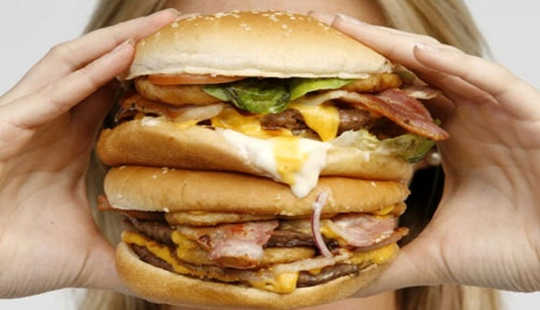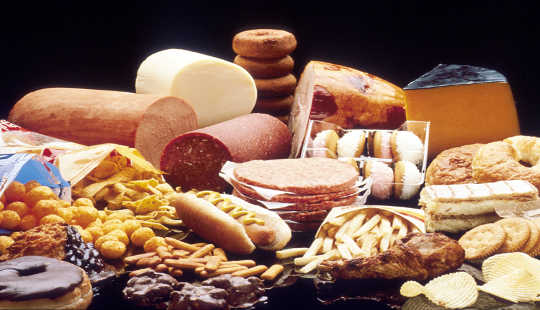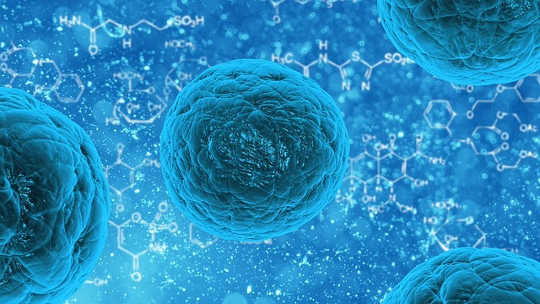 In a recent survey, one-third of Australian women who were pregnant or had a child 11 years or younger said they had taken either a prescription or over-the-counter medicine during pregnancy.
In a recent survey, one-third of Australian women who were pregnant or had a child 11 years or younger said they had taken either a prescription or over-the-counter medicine during pregnancy.
![bowls of apples & oranges on counter Share This Article facebook twitter Action Beyond the usual advice about less food and more exercise, the study suggests that consciously replacing unhealthy cues with healthy ones in the home could have a real impact on a person's BMI, especially for women. (Credit: Abi Porter/Flickr) How the kitchen counter can predict your weight Cornell University rightOriginal Study Posted by George Lowery-Cornell on October 20, 2015 You are free to share this article under the Attribution 4.0 International license. The types of ready-to-eat foods on a kitchen countertop could also hint at the weight of the people in the home, particularly women. The study looked at photographs of more than 200 kitchens in Syracuse, New York, to test how the food environment relates to the body mass index (BMI) of the adults at home. The women in the study who kept fresh fruit out in the open tended to be a normal weight compared with their peers. But when snacks like cereals and sodas were readily accessible, those people were heavier than their neighbors—by an average of more than 20 pounds. “It’s your basic See-Food Diet—you eat what you see,” says Brian Wansink, professor and director of the Cornell Food and Brand Lab and lead author of the paper in the journal Health Education and Behavior. [Would you take food advice from a heavier blogger?] The study finds that women who kept soft drinks on their counter weighed 24 to 26 pounds more than those who kept their kitchen clear of them. A box of cereal on the counter lined up with women there weighing an average 20 pounds more than their neighbors who didn’t. “As a cereal-lover, that shocked me,” says Wansink. “Cereal has a health-halo, but if you eat a handful every time you walk by, it’s not going to make you skinny.” When unhealthy foods are the most visible options in the kitchen, falling into habits that lead to weight gain becomes easier. Keeping those foods out of sight by sequestering them in pantries and cupboards reduces their convenience, making it less likely that they will be grabbed in a moment of hunger. Clearing the counters of the cereals, sodas, and other snack items and replacing them with healthier visible cues like fresh fruit could help, the study finds: Women who had a fruit bowl visible weighed about 13 pounds less than neighbors who didn’t. [Could a bribe entice you to eat less?] The study also finds that normal-weight women were more likely to have a designated cupboard for snack items and less likely to buy food in large-sized packages than those who are obese. The findings provide new insights into the role environmental factors play with obesity and offer remedies to rid the home of unhealthy cues while promoting the healthy ones. Rather than just the usual dietary advice prescribing less food and more exercise, the study suggests that consciously replacing unhealthy cues with healthy ones in the home could have a real impact on a person’s BMI, especially for women. “We’ve got a saying in our lab, ‘If you want to be skinny, do what skinny people do,'” Wansink says. Source: Matt Hayes for Cornell University](/images/2015/540/apples_and_oranges.jpg)
Beyond the usual advice about less food and more exercise, the study suggests that consciously replacing unhealthy cues with healthy ones in the home could have a real impact on a person's BMI, especially for women.
 Dietary nutrients are critical for brain structure and function, so they have a potentially profound impact on mental health. An increasingly robust body of research points to the detrimental effect of unhealthy diets and nutrient deficiencies, and to the protective value of healthy diets – along with select nutritional supplements as required – for maintaining and promoting mental health.
Dietary nutrients are critical for brain structure and function, so they have a potentially profound impact on mental health. An increasingly robust body of research points to the detrimental effect of unhealthy diets and nutrient deficiencies, and to the protective value of healthy diets – along with select nutritional supplements as required – for maintaining and promoting mental health.
 "It's kind of ironic. In our laboratory, working with carbon nanotubes, we wear facemasks to prevent exactly what we're seeing in these samples, yet everyone walking around out there in the world probably has at least a small concentration of carbon nanotubes in their lungs," says Lon Wilson.
"It's kind of ironic. In our laboratory, working with carbon nanotubes, we wear facemasks to prevent exactly what we're seeing in these samples, yet everyone walking around out there in the world probably has at least a small concentration of carbon nanotubes in their lungs," says Lon Wilson.
 U.S. Surgeon General Vivek Murthy recently released a call to action detailing the benefits of walking for at least 20 minutes a day. Of course, all exercise is good for you, but Murthy says walking tends to be the easiest for people to stick with .
U.S. Surgeon General Vivek Murthy recently released a call to action detailing the benefits of walking for at least 20 minutes a day. Of course, all exercise is good for you, but Murthy says walking tends to be the easiest for people to stick with .
 Mercury pollution is one of the most insidious problems in our environment. Today my colleagues and I at Flinders University have unveiled a new material than can scrub mercury from the environment, as a result of research to be published this week.
Mercury pollution is one of the most insidious problems in our environment. Today my colleagues and I at Flinders University have unveiled a new material than can scrub mercury from the environment, as a result of research to be published this week.
 Bipolar disorder is a diagnosis given to people who experience periods of intense low mood but also periods of elation and increased energy which can lead to impaired judgement and risky behaviour. The Royal College of Psychiatrists estimates that around 1% of the adult population experience bipolar symptoms at some point in their life.
Bipolar disorder is a diagnosis given to people who experience periods of intense low mood but also periods of elation and increased energy which can lead to impaired judgement and risky behaviour. The Royal College of Psychiatrists estimates that around 1% of the adult population experience bipolar symptoms at some point in their life.
 Nearly four in 10 older adults say managing their health care needs is difficult for them and their families. They also say medical appointments or tests get delayed or don’t get done, or that all of the requirements of their health care are too much to handle.
Nearly four in 10 older adults say managing their health care needs is difficult for them and their families. They also say medical appointments or tests get delayed or don’t get done, or that all of the requirements of their health care are too much to handle.
 Antioxidants have made a fortune for the dietary supplement industry, but how many people really know what they are and why they’re supposedly good for you? One common claim is that the these molecules can protect you from cancer.
Antioxidants have made a fortune for the dietary supplement industry, but how many people really know what they are and why they’re supposedly good for you? One common claim is that the these molecules can protect you from cancer.
 Hate the taste of Brussels sprouts? Do you find coriander disgusting or perceive honey as too sweet? Your genes may be to blame.
Hate the taste of Brussels sprouts? Do you find coriander disgusting or perceive honey as too sweet? Your genes may be to blame.
 Many workplaces are sedentary environments, and researchers say it's important that people understand the effects of sitting on their vascular health. By breaking up desk time with a short walk, workers can offset the harm caused to vascular blood vessels.
Many workplaces are sedentary environments, and researchers say it's important that people understand the effects of sitting on their vascular health. By breaking up desk time with a short walk, workers can offset the harm caused to vascular blood vessels.
 Food intolerance is often dismissed as a modern invention and a “first-world problem”. However, a study analysing the genomes of 101 Bronze-Age Eurasians reveals that around 90% were lactose intolerant.
Food intolerance is often dismissed as a modern invention and a “first-world problem”. However, a study analysing the genomes of 101 Bronze-Age Eurasians reveals that around 90% were lactose intolerant.
 A new study of more than 500,000 Chinese adults over seven years finds that participants who ate foods flavored with chili peppers every day reduced their risk of premature dying by 14 percent, as compared to people who ate chili peppers less than once a week.
A new study of more than 500,000 Chinese adults over seven years finds that participants who ate foods flavored with chili peppers every day reduced their risk of premature dying by 14 percent, as compared to people who ate chili peppers less than once a week.
 Cancers have many strategies for avoiding attacks from the immune system. And now scientists have identified a new one.
Cancers have many strategies for avoiding attacks from the immune system. And now scientists have identified a new one.
 The need to find fuel to generate energy is a profound drive within the biology of all living organisms: we all need food to survive. So it’s not surprising that our bodies have such a complex system to control food intake, driven by hormones.
The need to find fuel to generate energy is a profound drive within the biology of all living organisms: we all need food to survive. So it’s not surprising that our bodies have such a complex system to control food intake, driven by hormones.
 Following a healthy diet can be hard. From deciding when and what to eat to how much food you actually put on your plate, the average person makes over 200 food-related decisions each day, most of which are automatic.
Following a healthy diet can be hard. From deciding when and what to eat to how much food you actually put on your plate, the average person makes over 200 food-related decisions each day, most of which are automatic.
 The uptick in plastic packaging is a result of schools' efforts to streamline food preparation and meet federal nutrition standards while keeping costs low. "If this is an avoidable exposure, do we need to risk it? If we can easily cut it out, why wouldn't we?" says Jennifer Hartle.
The uptick in plastic packaging is a result of schools' efforts to streamline food preparation and meet federal nutrition standards while keeping costs low. "If this is an avoidable exposure, do we need to risk it? If we can easily cut it out, why wouldn't we?" says Jennifer Hartle.
 Drinking concentrated beet juice, which is high in nitrates, increases muscle power in patients with heart failure, a new study shows. “It’s a small study, but we see robust changes in muscle power about two hours after patients drink the beet juice,”
Drinking concentrated beet juice, which is high in nitrates, increases muscle power in patients with heart failure, a new study shows. “It’s a small study, but we see robust changes in muscle power about two hours after patients drink the beet juice,”
 "Yoga may be especially well-suited to people with arthritis," says Susan J. Bartlett. "It combines physical activity with potent stress management and relaxation techniques, and focuses on respecting limitations that can change from day to day."
"Yoga may be especially well-suited to people with arthritis," says Susan J. Bartlett. "It combines physical activity with potent stress management and relaxation techniques, and focuses on respecting limitations that can change from day to day."
 In this excerpt, Ewald Kliegel provides reflexology techniques for one of the most common human ailments – the headache. The head is prone to different problems – from throbbing temples with the sensation of being trapped in a vice, while a jackhammer is busy at work in the background, to having a brain that feels as though it is made of cotton wool.
In this excerpt, Ewald Kliegel provides reflexology techniques for one of the most common human ailments – the headache. The head is prone to different problems – from throbbing temples with the sensation of being trapped in a vice, while a jackhammer is busy at work in the background, to having a brain that feels as though it is made of cotton wool.
 When you drop a piece of food on the floor, is it really OK to eat if you pick up within five seconds? This urban food myth contends that if food spends just a few seconds on the floor, dirt and germs won’t have much of a chance to contaminate it.
When you drop a piece of food on the floor, is it really OK to eat if you pick up within five seconds? This urban food myth contends that if food spends just a few seconds on the floor, dirt and germs won’t have much of a chance to contaminate it.
 While excess weight and obesity is a growing global concern, there has been more and more advertising and promotional effort encouraging the consumption of unhealthy food.
While excess weight and obesity is a growing global concern, there has been more and more advertising and promotional effort encouraging the consumption of unhealthy food.
 The words “stem cell research and therapy” evoke a number of responses. In emotionally vulnerable patients, a sense of hope. In scientists, a great deal of excitement about future prospects.
The words “stem cell research and therapy” evoke a number of responses. In emotionally vulnerable patients, a sense of hope. In scientists, a great deal of excitement about future prospects.
















